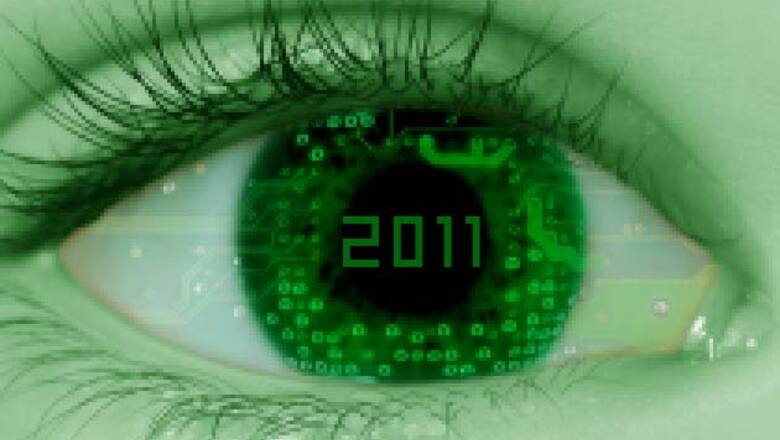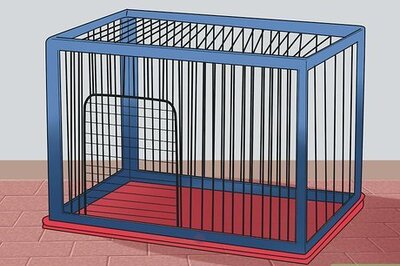
views
Technology and soothsaying aren't congruent. But every year-end tech enthusiasts, the world over, pull out their keyboards and frantically type out what they think will make or break in the year that comes next. Unlike soothsaying, most tech foretelling isn't cooked out of thin air; therefore there are greater chances of them coming true. If not, I can always blame it on the vagaries of the world of tech. Nevertheless, here are my 10 tech predictions for the year 2K11.
Email will fade but death not imminent
This has already started to happen. People are using less of email than before and communicating more via social networking services. But contrary to many other predictions the ubiquitous email will not die any time soon (they had even predicted the death of the RSS feed, but that also shows no signs death or decay).
For the corporate world the email will remain as the official medium of communication (also because social networking websites are blocked in many workplaces). Its usage will diminish for personal communication but people will continue to log in to their email accounts whenever they fire up the computer, even if it is just to delete the newsletters, spam and to retrieve/regenerate lost passwords.
The most important reason that the email cannot drown in the social media deluge, is that you would still need an email ID to sign up for the social networking services.
Internet: the new battleground
The impact of the Avenge Assange DDoS (distributed denial-of-service) attacks made international headlines. This has shown tech-savvy dissenters the tools to make the impact of their protests felt. The anonymity and the relatively level playing field provided by the Internet will further encourage the disgruntled to express their angst online and such attacks will only increase in the next year.
The battle on the Internet will not only be played between hacktivists and their targets, even governments will unleash their cyber arsenals against each other. We have seen a few such instances in 2010 and this will only be stepped up in 2011. The Third World War will happen in the cyberia and the seeds may well be sown in 2011.
Rise of the superphones
If the last few years were marked by the emergence of the smartphones, 2011 could usher in the era of the superphones. The smartphones of today match the power of the desktop computers of yesterday, but the superphones will not only match the abilities of their desktop and laptop contemporaries but also so much more. The current definition of the superphone will also need to go for an overhaul. Amongst other things, superphones will come with built in pico projectors for an on-demand large screen display.
On cloud number nine
With tech behemoths Google and Microsoft already embroiled in a battle for the largest piece of the cloud-computing pie, the cloud will only get wetter. While we are still a bit sceptical about the success of the Google Chrome OS, it does show the path to the future and that is securely stored on the cloud. Governments and companies have already initiated the move to the cloud but it will take longer for the aam online aadmi to fully embrace the cloud.
Three-dimensional disappointment
While many have touted it as the next big thing in TV, I am still a bit wary of rushing out and splurging my salaries on a 3D TV set. And I will also hold on to my dear money in 2011. Irrespective of the advertising spends and ooh and aahs by some 'tech gurus', 3D TVs aren't selling well and will not top any sales charts in 2011. This is because the current set of 3D TVs still feel like a proof of concept and there isn't just enough 3D content around (how many times can you watch Avatar over and over again? Also they give you a headache). While they are already working on how to get rid of the glasses, I will prefer wait a little longer for my first 3D TV.
Padding up on the tablets
When the iPad was first announced, it received a whipping but after it went on sale it became a bestseller and ushered in the post-netbook era of tablets. Such is the weird world of tech.
While tablets may be selling fast in the developed economies, it needs come below the Rs 20K barrier to register significant sales in the Indian market. Price (and satisfactory performance) was the secret behind the success of netbooks and to replicate that, tablets will have to tread the same path.
It will raining tablets in 2011, with low-cost mobile manufacturers joining the fray. Android will rule the roost in the tablet market with Google launching tablet-specific versions of the operating system.
As for the iPad, its prohibitive pricing will remain a deterrent for the Indian buyer. Also MeeGo and HP webOS will make things even more interesting. So will the launch of the Notion Ink Adam.
The multi-purpose tablet devices will also eat in the e-book reader market and more people will revive the lost habit of reading books albeit in a digital version.
Mobile Internet accelerated
In 2011, 3G will make further inroads in the Indian mobile phone market and it will also change the dynamics of the Indian online industry and they will increase their offerings for the mobile phone user.
Quite like mobile phones overtaking fixed-line connections many years ago, Internet on the mobile will show significant signs of overtaking usage from desktop and laptop computers in 2011.
General users will also start accepting the mobile phone as a transaction device to make payments.
LED as the primary source of light
The humble LED has been around for decades and it has recently made headway in lighting up Indian homes. The Indian consumer is gradually becoming more aware of the advantages of LEDs over other traditional forms of lighting. In 2011 we will see more LEDs in living rooms and bedrooms across the country. I have already made my beginning.
Beyond the dot com
Consumption of mainstream website content through apps and social media will start to overshadow that on the parent website. This is already happening. The updates on fan pages of many websites get more exposure and eyeballs than the actual website itself. While apps, Facebook and Twitter will be at the forefront of alternate modes of content consumption, some new fronts will also open in 2011.
The struggling OSes
The Android onslaught has the competition worried. Samsung has smartly taken the "if you can't beat them, join them" approach and will continue to reap the benefits for all of 2011 and so will LG and Motorola. While Windows Phone 7 gave positive vibes, it seems unlikely that that will be good enough to revive the Windows Mobile's sagging fortunes.
Research In Motion also needs to get it act straight. Merely targeting the young generation through ads for BlackBerry phones will not suffice; the youthfulness should also be evident in the products.
Nokia's new-age phones have for so far been a disappointment. They need to do something fast with their software or use the cards up its sleeve.
This essentially means that Android, further boosted by budget devices, will reign the smartphone market in 2011. Apple with its monolithic approach will fall behind, but will continue to have its share of fans.
The two things that changed our lives the most in the first decade of the 21st century are in fact carry-overs from the last decade of the 20th century: Internet and mobile phones. The next decade will not distinguish between the two. My dream universal device to serves all purposes will finally emerge. We have already seen the beginnings, 2011 will add to the acceleration. It's going to be exciting. My seatbelt is fastened.




















Comments
0 comment